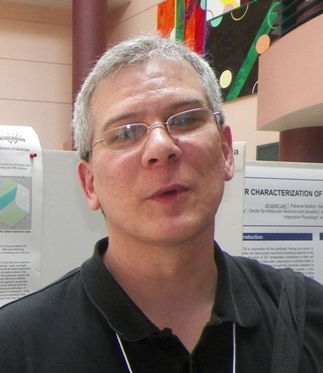Donald James DeGracia Ph.D. (ad3351)
University information
Contact information
Physiology
Dr. DeGracia studies the mechanisms of cell death following brain ischemia and reperfusion. This clinically relevant research models brain injury that occurs following stroke or following resuscitation from cardiac arrest. The main focus of this work is the causes and consequences of reperfusion-induced inhibition of protein synthesis. Dr. DeGracia's previous work established that phosphorylation of eukaryotic initiation factor 2 alpha occurs in the reperfused brain. Further, this phosphorylation is caused by the eIF2 alpha kinase PERK. PERK activation is part of an endoplasmic reticulum stress response known as the unfolded protein response (UPR). Dr. DeGracia has investigated expression of the UPR in the reperfused brain and developed evidence that the UPR is expressed in an apparently dysfunctional fashion. Current work in the lab is assessing the role of mRNA regulation via stress granules and HuR granules in prolonged translation arrested in reperfused vulnerable neurons.
Dr. DeGracia is not accepting students for the 2023-24 academic year.
- 1988-93 Research Assistant, Deptartment of Emergency Medicine, Wayne State University
- Brain ischemia and reperfusion injury
- Regulation of protein synthesis
- Stress-mediated translation arrest
- Unfolded protein response

Translational Neuroscience Program
We study the mechanisms of cell death following brain ischemia and reperfusion, focusing on the causes and consequences of reperfusion-induced inhibition of protein synthesis, or translation arrest. This translation arrest appears to be part of the post-ischemic neuronal stress response. We have evaluated classical ribosome biochemistry, intracellular stress responses and most recently began investigating mRNA regulatory mechanisms, including stress granules and HuR granules. The lab is currently funded by the National Institute of Neurological Disorders and Stroke at the NIH.
Disease/Disorder
Brain ischemia and reperfusion injury: stroke, cardiac arrest and resuscitation brain damage.
Species
Rodents
Methods
Molecular biology.
Key Collaborators
Jose Rafols, Ph.D.

Courses taught by Donald James DeGracia Ph.D.
Fall Term 2025 (future)
Fall Term 2024
- PSL7010 - Basic Graduate Physiology Lecture I
- PSL7011 - Basic Integrative Graduate Physiology I
- PSL7660 - Advanced Neurophysiology
- IBS7015 - Interdisciplinary Cell and Molecular Biology
- MGG7010 - Molecular Biology and Genetics